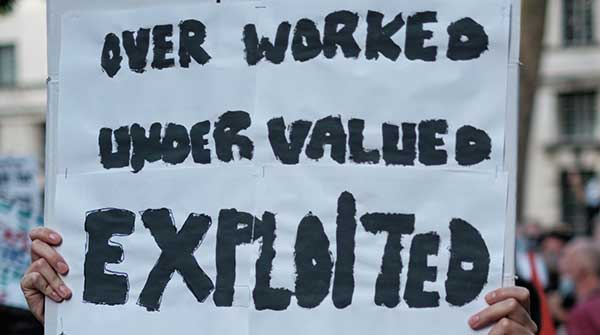Metro strike is a battle against the inexorable march of automation and artificial intelligence in the grocery industry
 Amidst the summer heat, a cold front has descended upon the Greater Toronto Area. However, this frigid front has nothing to do with the weather and everything to do with a growing chasm between grocery giant Metro and its 3,700 striking workers. The consequences of this clash extend far beyond the picket lines, threatening to reshape the entire grocery industry in Canada.
Amidst the summer heat, a cold front has descended upon the Greater Toronto Area. However, this frigid front has nothing to do with the weather and everything to do with a growing chasm between grocery giant Metro and its 3,700 striking workers. The consequences of this clash extend far beyond the picket lines, threatening to reshape the entire grocery industry in Canada.
The strike, which started on July 29, has thrown 27 Metro stores across the GTA into disarray. Workers walked off the job after rejecting a tentative agreement recommended by their own bargaining committee – a move that sent shockwaves throughout the industry.
Until this week, the strike impacted only these 27 stores, but its effects are steadily rippling outward. Most Metro consumers in Ontario will likely witness the consequences of this labour dispute through empty spaces in various sections of their grocery stores. Halting trucks departing from distribution centres could sadly result in more food waste, as discarding food may be necessary if the cargo is no longer safe to consume – a bold move indeed by the striking workers.
But make no mistake; this strike is a litmus test for the public’s moral compass, and so far, the workers have garnered substantial support. Despite the potential for a settlement favouring workers to push food prices even higher, the public’s response has been surprisingly muted.
When the “Hero Pay” program was introduced during the pandemic, it revolved around work hazards and the risks associated with the virus. The public sympathized. However, with higher food prices now at the forefront, the context has shifted. This is about making the grocery industry an attractive career option, but more importantly, it’s about ensuring dignified work.
While Metro allocated millions in bonuses to a handful of executives, employees received a gift card of up to $300, exclusively redeemable at Metro-owned stores. It’s no wonder Metro finds itself embroiled in a strike.
Nonetheless, while this dispute undoubtedly centers on wages and benefits, it signifies a larger battle – one that pits traditional labour practices against the inexorable march of automation and artificial intelligence. The workers on the picket lines are not simply pursuing personal gains; they are essentially championing the cause of every grocery store employee in Canada. Their strike symbolizes a broader struggle against a business model that relies on top-heavy organizations while prioritizing low margins and meagre wages.
Conversely, grocers across Canada are watching closely. If the workers succeed in their demands, it could set a precedent that resonates far beyond the picket lines. The prospect of fair wages and improved working conditions may become the new normal, but it could also usher in a seismic shift in how groceries are delivered to our shelves.
Automation and AI are knocking on the doors of the grocery industry, promising efficiency and cost savings. If workers secure concessions through this strike, grocers might be encouraged to explore alternative avenues, such as increased utilization of AI and automation. The traditional model of hiring around 80 full-time employees to operate a store could give way to hiring fewer than 50 workers with higher wages and an entirely different skill set focused on managing and maintaining automated systems. The public should prepare for this potential transformation as well.
As the strike continues, it is likely to intensify with each passing week. The longer it endures, the deeper the scars it will leave on both sides. The grocery industry, like many others, stands at a crossroads. How it navigates this strike and its aftermath will establish a precedent for the entire Canadian labour landscape.
If Metro’s workers succeed in their fight for fair compensation and humane working conditions, the way grocery stores operate in Canada could undergo a profound transformation. The substantial influx of self-checkouts, as irritating as it may have been to many Canadians, could only mark the beginning of this evolution.
Dr. Sylvain Charlebois is senior director of the agri-food analytics lab and a professor in food distribution and policy at Dalhousie University.
For interview requests, click here.
The opinions expressed by our columnists and contributors are theirs alone and do not inherently or expressly reflect the views of our publication.
© Troy Media
Troy Media is an editorial content provider to media outlets and its own hosted community news outlets across Canada.


